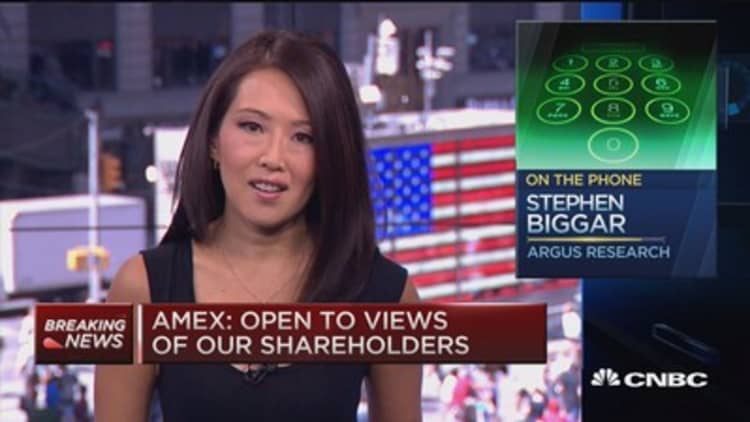
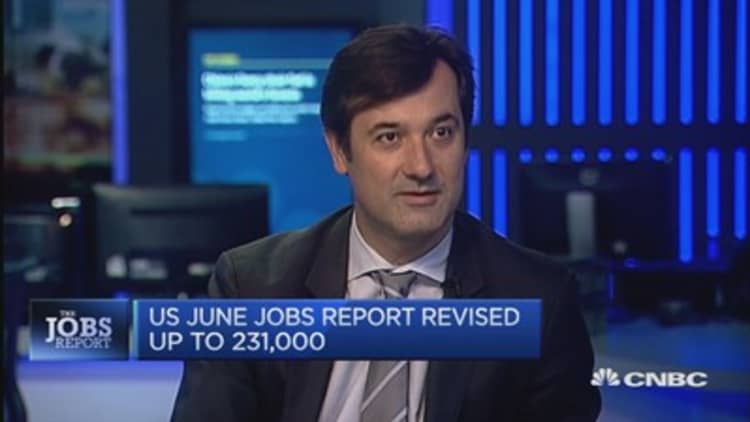
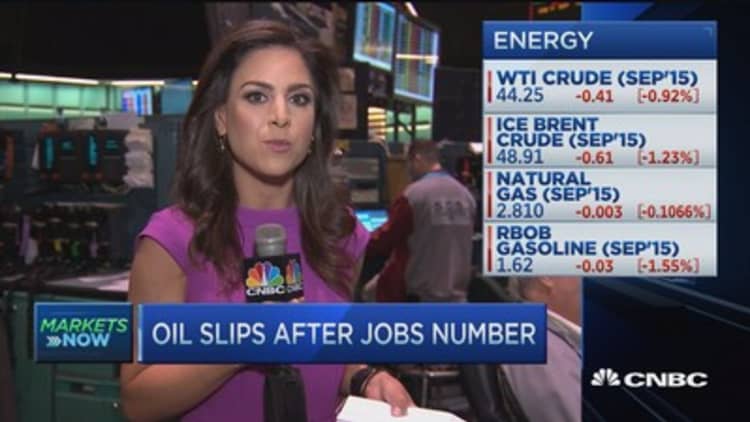
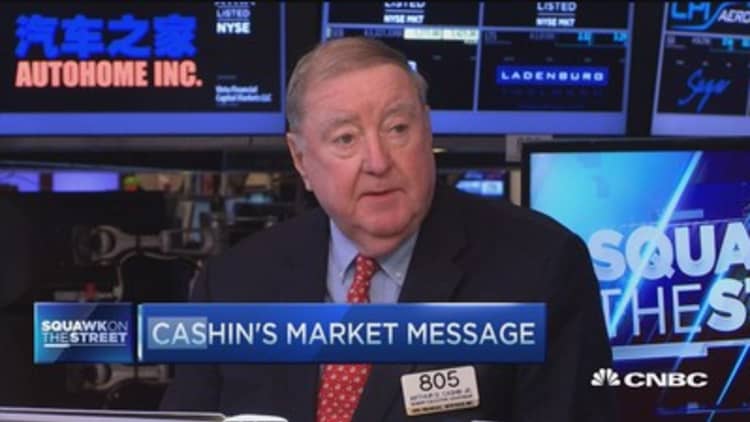
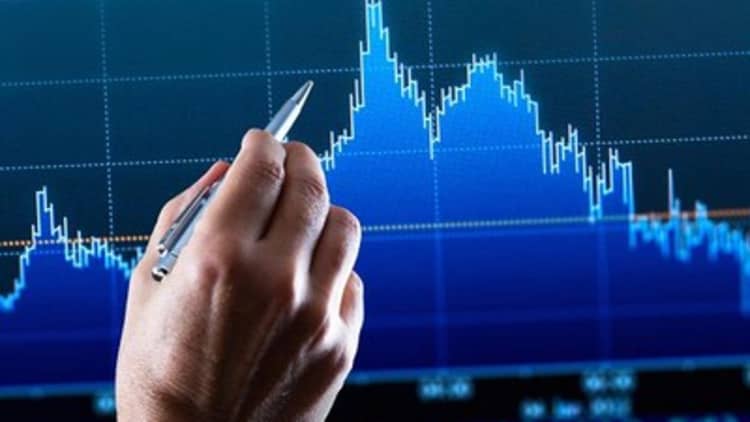
U.S. stocks closed slightly lower on Friday as news of an activist stake in American Express offset some of the pressure from oil's decline, following an in-line nonfarm payrolls report. (Tweet This)
The major averages ended the week about 1.5 percent lower, with the Dow Jones industrial average the worst performer.
Stocks halved losses in afternoon trade, with American Express jumping more than 6 percent on news that ValueAct took a $1 billion stake in the firm. In afternoon trade, trade volume in shares of the financial services firm was nearly double its average for the entire day.
A stake that size gives ValueAct about 13 million shares, which is less than a tenth of what Warren Buffett holds.
"ValueAct is a well-respected firm. We have been speaking with them, as we do with other investors, and look forward to continuing a constructive dialogue," American Express said in a statement to CNBC. "At American Express, we are focused on building long-term value for shareholders, and are always open to the views and perspectives of our investors."
The Dow Jones industrial average closed about 45 points lower, off an earlier decline of more than 100 points. The index posted 7 straight days of decline, the worst losing streak since the summer of 2011. The Dow transports fell 1.4 percent.
Media stocks ended 0.5 percent higher, down about 7.5 percent for the week. Biotech declines weighed on the Nasdaq. The iShares Nasdaq biotechnology ETF (IBB) closed 0.38 percent lower, with about 84 percent of constituents having a market cap of more than $500 million in correction territory.
Energy plunged 1.85 percent as the greatest decliner in the S&P 500 for the day and the week. Utilities was the best sector for the day and week.
"I think the market's successfully digested the nonfarm payrolls number and now shifting to fundamental drivers like the commodity complex," said Art Hogan, chief market strategist at Wunderlich Securities.
WTI crude settled down 79 cents, or 1.77 percent, at $43.87 a barrel, its lowest level since March 17. Oil has declined for six straight weeks. Brent hit a fresh 6-month low of $48.55.
"If the U.S. economy has been showing resilience, the Fed raising rates at a time when global growth is slowing, that's pretty unattractive," said Jeremy Zirin, head CIO investment strategist at UBS Wealth Management Americas.
The July nonfarm payrolls report said that 215,000 jobs were added in July slightly below estimates for 223,000. The unemployment rate was 5.3 percent and average hourly earnings rose 0.2 percent, as expected.
"There's not much reaction because it's so much in-line with expectations," said Kate Warne, investment strategist at Edward Jones. "The details of the report suggests the slow healing of the economy is continuing."
Futures briefly attempted gains after initially extending losses on the employment data.
"At this point I think we have to assume a September rate rise is still in the picture. This is exactly what we want to continue to see," said Brad McMillan, chief investment officer at Commonwealth Financial. "I think part of what the market is coming to terms with is a rate increase is more likely than not at this point."
Read MoreJobs report keeps Fed on track, September odds rise
"I think it shifts the focus to what's going to happen in September and it looks like the likelihood of a policy change is increasing and adds some uncertainty (to stocks)," said Greg Woodard, portfolio strategist at Manning & Napier.
Still, he noted that trends are moving in the right direction. "I think you should continue to see modest improvement in the labor market," Woodard said.
In another indicator of a better employment environment, CBIZ Payroll Services on Friday said its Small Business Employment Index showed hiring increased 0.22 percent in July, breaking a six-year trend of negative reads for the month.
May consumer credit was revised up to $16.52 billion from $16.09 billion, Dow Jones reported.
The traded near 0.72 percent after initially rising to 0.74 percent, while the 10-year yield declined to 2.17 percent, off an initial gain to 2.24 percent.
"I think it tells you there's not a lot of impetus on inflation. This is the wage story," said Todd Hedtke, vice president for investment management at Allianz Investment Management. "Inflation is no where to be found. It's more the Fed wants to create a few buffers for themselves (by having rates above zero)."
The dollar index turned lower after touching its highest level since the end of April, with the euro reversing to trade near $1.09.
John Caruso, senior market strategist at RJO Futures, noted that the jobs report did miss expectations.
"This leaves a lot of questions if the Fed is going to move in September so I think the bulls saw this as as good time to take profit (on the dollar)," he said.
Futures pointed to a 55 percent chance of a September hike, up from 47 percent before the jobs report, RBS said on Friday.
"What the (report) really does is put focus on next month's jobs report," Warne said. "While they said they need 'some' (growth) they would like to see more."
The Federal Reserve said in its July statement it would need to see "some further improvement in the labor market" in order to raise rates. Liftoff could come for the first time in nine years at the Fed's September 16 and 17 meeting.
That trajectory marks a divergence from global central banks. The Bank of England left rates unchanged on Wednesday and the Bank of Japan kept monetary policy steady on Thursday.
European stocks closed mostly lower after the U.S. jobs report, while Asian stocks ended mostly higher. Shanghai Composite closed up nearly 2.3 percent on reports of more possible support measures.
U.S. stocks closed lower on Thursday, weighed by a plunge in biotech and media stocks. The Dow ended at its lowest level in 6 months and posted its first 6-day losing streak since October.
Major U.S. Indexes
In morning earnings reports, Cablevision reported a 1.6 percent increase in quarterly revenue, boosted by an increase in fees to its cable customers. Net income attributable to stockholders fell to 27 cents from 35 cents a year earlier, while net revenue rose to $1.65 billion from $1.63 billion.
Hershey posted its weakest sales performance in more than five years, hurt by low demand in China. The chocolate maker posted a net loss of 47 cents a share for the second quarter, versus a gain of 75 cents from the same period last year. Net sales were flat at $1.58 billion.
Read MoreEarly movers: GRPN, JD, LNG, SFM & more
The Dow Jones Industrial Average closed down 46.37 points, or 0.27 percent, at 17,373.38, with with Wal-Mart leading decliners and American Express the greatest advancer.
The closed down 5.99 points, or 0.29 percent, at 2,077.57, with energy leading seven sectors lower and utilities the greatest advancer.
The Nasdaq closed down 12.90 points, or 0.26 percent, at 5,043.54.
The CBOE Volatility Index (VIX), widely considered the best gauge of fear in the market, traded above 14.
About three stocks declined for every two advancers on the New York Stock Exchange, with an exchange volume of 830 million and a composite volume of 3.6 billion in the close.
High-frequency trading accounted for 49 percent of August to date's daily trading volume of about 7.0 billion shares, according to TABB Group. During the peak levels of high-frequency trading in 2009, about 61 percent of 9.8 billion of average daily shares traded were executed by high-frequency traders.
Gold futures settled up $4.00 at $1,094.10 an ounce.
Friday
Earnings: Berkshire Hathaway
More from CNBC.com:


